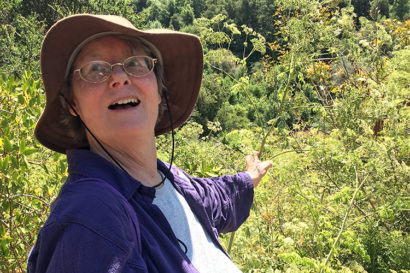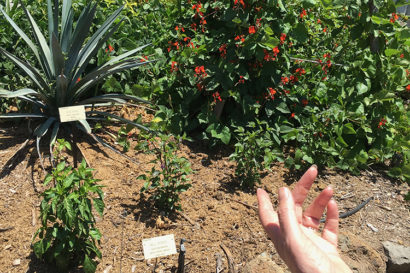Berkeley Talks: Take an intoxicating plants tour at the UC Botanical Garden
Sal Levinson, who grows the plants they sell at the garden, gave a tour about the plants people have used to heal pain, cause pain, bring pleasure, celebrate the sacred and symbolize faith.
August 16, 2019
Subscribe to Berkeley Talks, a podcast that features lectures and conversations at UC Berkeley.

Sal Levinson grows the native plants sold at the UC Botanical Garden. (UC Berkeley photo by Katie Fleming)
Sal Levinson, who works on native propagation at the UC Botanical Garden, led a tour on July 9, 2019, about the plants people have used to heal pain, cause pain, bring pleasure, celebrate the sacred and symbolize faith. From the Cycad, a poisonous plant that the dinosaurs ate and some people have learned how to eat, to California native rye, a type of grass that gets a fungus called ergot that has been used to treat migraine headaches and for other medicinal purposes.
“Ergot is effective for stopping bleeding,” Levinson tells a group of 20 on the tour. “The wise women in ancient times would commonly use it after childbirth. Some women would start bleeding out after childbirth, and if they used this drug, they could stop the bleeding and save the women.”

During the tour, Levinson points out an Agave tequilana, a plant used to make to tequila. (UC Berkeley photo by Katie Fleming)
This walk was hosted in conjunction with the current exhibit on view at the Phoebe A. Hearst Museum of Anthropology, Pleasure, Poison, Prescription, Prayer: The Worlds of Mind-Altering Substances.
The 34-acre UC Botanical Garden is one of the most diverse landscapes in the world, with over 10,000 types of plants, including many rare and endangered species. Organized geographically, the garden features nine regions of naturalistic plantings, from Italy to South Africa, along with a major collection of California native plants. The garden was established in 1890 and its living collections are invaluable resources for international research and conservation.
Learn more about the UC Botanical Garden.